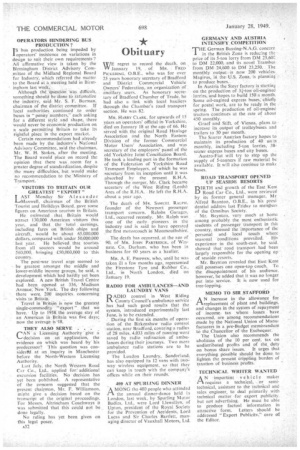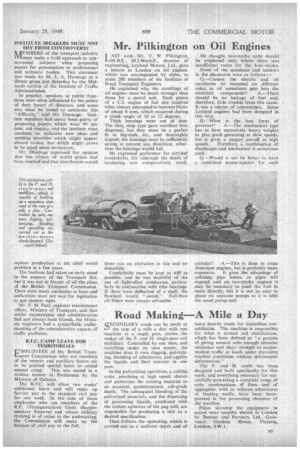Obituary
Page 8

Page 9

If you've noticed an error in this article please click here to report it so we can fix it.
OPERATORS HINDERING BUS PRODUCTION?
is bus. production being impeded by 'operators' insistence on variations in design to suit their own requirements ? Ail affirmative view is taken by the Birmingham District Advisory Committee of the Midland Regional Board for Industry', which referred the matter to the Board at a meeting held in Birm
ingham last week.: , Although the "Otiestion was difficult, something shOuld beilOne Co rationalize the industry, said Mr. S. F. Burman, chairman of the district committee. If local authorities continued to order buses in " penny numbers," each asking for a different Style and shape, there would never be economic production on a scale permitting Britain to take its rightful place in the export Market.
Certain recommendations had already been made by .the industry's National Advisory Committee, said the chairman, Mr. W. H. Stokes, after the meeting. The Board would place on record the opinion that there was, room for a greater degree of standardization, despite the many difficulties, but would make no recommendation to the Ministry of Transpbrt.
VISITORS TO BRITAIN OUR GREATEST "EXPORT" "
LAST Monday Sir A I e xa n der Maxwell, chairman of the British Tourist and HolidaysilOard, gave some figures on American tourism in Britain.
He estimated That Britain would attract 130,000 American visitors this year, and that the total earnings, including fares on "British 'ships and aircraft, would be about 65,000,000 dollars. compared with under 50,000,000 last year. He believed, that tourists from all sources woul be around 560,000, bringing .£50,000,000 to this country. ,
The post-war travel urge seemed to be greatest amongst the middle and lower-middle income groups, he said, a development which'had hafdly yet been explored. A new British Travel Centre had been opened at 336>' Madison Avenue; New York. The day following there were, 200 inquiries, concerning
visits to Britain. ..
Travel in 'Britain is now the greatest single-commodity " export" that we have.Up to 1938, the average stay of an American in-Britain was' five days; now the average is'18.
THEY ALSO SERVE . .
rAN' a Licensing Authority give a 1,—,decision on an application, the evidence on which was heard by' his predecessor? This question was considertill . at an inquiry in Manchester before the North-Western Licensing Authority.
Last July, the North Western Road Car Co., Ltd., applied for: additional excursion facilities. No decision has yet been published. A representative of the concern suggested that the present chairman, Mr. F. Williamson, might give a decision based on the transcript ot the original proceedings. For Messrs. Altrincham Coachways it was submitted that this could not be done legally.
No ruling has yet been given on this legal poser.
A32 WIE regret to record the death, on
Iry January 19, , of MR. FRED PICKERING, 0.B.E., who was for over 25 years honorary secretary of Bradford and District Commercial Vehicle Owners' Federation, an organization of ancillary users. As honorary secretary of Bradford Chamber of Trade, he had also a. link with local hauliers through the Chamber's road transport section. He was -82.
MR. HARRY CLARK, for upwards of 15 years an operators' official' in Yorkshire, died on January 18 at the age of 66. He served with the original Road Haulage Association and the North Eastern Division of the former Commercial Motor Users' Association. and Was secretary of the employers' panel of the old Yorkshire Joint Conciliation Board. He took a leading part in the formation of the Federation of Yorkshire Road Transport Employers, of which he was secretary from its inception until it was absorbed by the present R.H.A. Through the merger, Mr. Clark became secretary of the West Riding (Leeds) Area of-the R.H.A. He left the R.H.A. about a year ago.
The death of MR, SinfLIEL RArrn. founder of the Newport passenger -transport concern, Ralphs Garages, -.Ltd., occurred recently. Mr. Ralph was one of the earlypioneers in the industry and is said to have operated the first motorcoach in Monmouthshire'.
The death has occurred, at the age of 90. of MR. JOHN PARTRIDGE, of Wingate, Co. Durham. who has been in business for 60 years as a haulier.
MR. A. E. PHIPPEN, who, until he was taken ill a few months ago, represented the Firestone Tyre and Rubber Co., Ltd., in North London, died on ..Tartuary 19.
RADIO FOR AMBULANCES—AND LAUNDRY VANS
RADIO control in West Riding County Council's ambulance service has had such good results that the system, introduced experimentally last June, is to be extended.
During the first six months of operation of the Birkenshaw radio control . station, near Bradford; covering a radius of 28 miles, 4,633 miles of running were saved by radio redirection of ambulances during their journeys. Two more ambulance radio stations are to be provided. The Luxdon Laundry, Sunderland; has also equipped its 12 vans with twoway wireless equipment, so that they can keep in touch with the company's offices while on their rounds: 409 AT SPURLING DINNER AMONG the 400 people who attrideci the annual dinner-dance held in London, last week, by Spurting Motor Bodies, Ltd., were Lord Llewellyn, of Upton, president of the Royal Society for the Prevention of Accidents, Lord Lucas and Sir Charles Bartlett, managing director of Vauxhall Motors, Ltd.
GERMANY AND AUSTRIA INTENSIFY. COMPETITION
THE German German Bussing-N.A,G concern in the British Zone is reducing the prize of its 5-ton lorry from DM 23,60'.; 16 DM 22,000, and its novel Trarnbus from DM 24,600 to DM 23250.. The monthly output is now 200 vehicles: Magirus,, in. the U.S. Zone, s planning to produce buses.
In Austria the Steyr factory is starting on-the prOduCtion of 3,1-ton oil-engined lorries, and-hopes to build 150 a month, Some -oil-engined express buses, chiefly for postal work, are to he ready in the spring. The production of oil-engined tractors continues at the rate of about 450 monthly.
Graef and Stift, of Vienna. plans to increase its output of trolleybuses and trailers to 30 per month.
The Sauer Austrian factory hopes to maintain its production of 40 un.ts monthly, including 5-ton lorries, 38seater express buses and city buses.
Austro-Fiat will try to step up the supply of 5-tonne.rs if raw material be available. It will also continue to rnak buses.
ROAD TRANSPORT OPENED UP SEASIDE RESORTS
BIRTH and growth of the East Kent Road Car Co., Ltd., were reviewed by its former general manager, Mr Alfred 1Baynton, 0.B.E.. in his presi. dented address last Friday to merobert of the Omnibus Society.
Mr. Baynton, very much at home , among probably the most enthusiastic students of passenger transport in this country, stressed the importance of the personal and local touch where seasonal conditions prevailed. His experience in the south-east, he said. showed that road transport had been largely responsible for the opening rip of seaside resorts.
Mr. Baynton revealed that East Kent still possesses one open-top coach. To , the disappointment of his audience, however, he added that it was no longer put into service. It is now used for tree-lopping. '
MEMO TO SIR .STAFFORD AN increase in the allowance for replacement of plant and buildings. and changes in the system of repayment of income, tax where losses have occurred, are among recommendations Made by the National Union of Manufacturers in a pre-Budget memeranduro to the Chancellor of the Exchequer.
The Union also recommends the abolition of the 10 per cent. tax on undistributed profits and of the, duty on bonus share issues. It urges that everything possible should be done to lighten the present crippling burden of taxation of business profits.
TECHNICAL WRITER WANTED
AN important vehicle maker requires a technical, or semitechnical, assistant to the technicaland sales engineer, to deal primarily with technical matter -for export publicity, but not advertising. He must be able to produce factual information in attractive form. Letters should be addressed "Export Publicity." care of the Editor.
INSTITUTE SPEAKERS MLfST NOT SHY FROM CONTROVERSY
MEMBERS of the transport industry must make a bold approach to controversial subjects when preparing papers for presentation to professional and technical bodies. This statement was made by M. J. A. Dunnage at a dinner given last .Saturday by the Mid. lands section of the Institute of Traffic Administration.
In practice, speakers at public functions were often influenced by the policy: of their board ofdirectors, and some way -must be found to• overcome this " difficulty," said Mr. Dunnage. Institute members -had never been guilty of preparing 'papers' which were 99 per cent. old history, and the Institute must continue ' to -welcome newideas and seeming novelties' which might appear absurd tó-day, but which might prove to be. good sense to-morrow.
Mr. Dunnage expressed the opinion that the climax of world prices had been reached and that distribution would replace production as the chief world problem in a few years.
The Institute had taken an early stand in the support of the Transport Act, hut-it was not in favour of all the plans of the British Transport Commission. 'There were many anomalies in fares and authorities must not wait for legislation to put matters right.
Mr. F. H. Paul, regional maintenance officer, Ministry of Transport, said that whilst maintenance and administration had not always been friends, the Ministry engineers had a sympathetic understanding of the administrative aspects of traffic problems.
B.T.C. CAMP LEAVE FOR TERRITORIALS
EMPLOYEES of the British TransLLAport Commission who are members of the reserve and auxiliary forces are to be granted specialleave to attend
annual camp. This was stated' in a written answer in Parliament by the Minister of Defence.
The B.T.C. will allow two weeks' additional leave and will make up Service pay to the standard civil pay for one week. In the case of those employees who are members Of the R.E. (Transportation) Units (Supplementary Reserve) and whose military training is of value to the undertaking, the Commission will make up the balance of civil pay to the full.




























